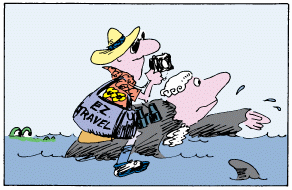
What do you say to a client who asks you to recommend a destination, or whether a particular tour or a cruise is suitable? What do you say to a client who asks you to choose a suitable tour, or a hotel or resort at a chosen destination?
How far should a travel agent go to in recommending holiday arrangements?
Travel agents have a clear responsibility to book tours, cruises and accommodation which are suitable for the client.
“A travel agent should weigh up a client’s expectations and budget, then choose a reputable tour operator and ensure the tour to be booked is suitable for the consumer,” says specialist tourism lawyer Anthony Cordato, author of the book “Australian Travel & Tourism Law”.
“Under the Trade Practices Act and the Fair Trading Acts, the agent warrants that the tour will be reasonably fit for the client. This means that tour must be suitable for the person and the purpose described by the client, and must be booked with a reputable product supplier.”
“Australian Travel & Tourism Law” gives some vivid examples of what can happen when a tour is unsuitable. In one case, a Mrs Bradley consulted a travel agent on the NSW Central Coast to discuss a holiday for herself, aged 57, and her diabetic husband, aged 63. In her words “I recall saying we wanted something that was different – and that is how Kashmir came up – but we also wanted something that wasn’t too strenuous because of John’s condition”. After reviewing several options suggested by the travel agent, they chose the “round Thailand coach tour”. They were told the tour would include a 5-hour boat trip, which would go around the rapids. Mrs Bradley was concerned about this aspect of the tour because her husband could not swim. Prior to leaving Australia, they were given only part of their itinerary. The part they were given did not include the boat trip.
On the sixth day of the tour, they were told to board the boats for the river trip. The boats had no seats. After complaining “we’re not getting in those boats” the guide replied “you have to get into the boats, you cannot stay here. It is the only way to get up the river”. Some hours later the boat came into “swirling water, seemed to lose its way before hitting a rock, sinking within seconds”. Mr Bradley drowned after staying afloat a short time by holding onto cushion in the boat.
The case surfaced in the NSW Supreme Court in 1995 when Mrs Bradley brought claims against the travel agent and the two tour operators (the second being the local operator) based on misleading and deceptive conduct and false representations contrary to sections 52 and 53 of the Trade Practices Act, and negligence. The court held that Australia was an appropriate forum for the proceedings, as opposed to Thailand. The case was eventually settled out of court on confidential terms, so we do not know what was agreed to be paid.
“The tour was clearly not suitable for a 64-year-old non-swimming diabetic,” Cordato comments. “The river trip was an integral part of the tour. It was not an excursion, and not an option. If the case had gone to court, the court would have apportioned responsibility, perhaps finding the tour operators 80% responsible and the agent 20% responsible.”
As an aside, Cordato says that in such cases, the legal system compensates less for death than for injuries, because injuries may require long-term medical care and will include compensation for pain and suffering. While $200,000 might compensate for a death, $600,000 might compensate for a serious injury. In both cases, a substantial additional amount is payable for loss of earnings.
The responsibility of an agent to choose suitable travel arrangements is not confined to tours.
There are a great many situations where the agent may be responsible for advising upon and booking suitable travel arrangements for the client. These situations have the “warning bells ringing”:
- Many cruises are advertised according to the demographic of the passenger – there are ‘kids cruises’, ‘luxury cruises’, ‘singles cruises’
- Where it is common knowledge that some airlines are unsafe and/or unreliable
- Some airlines and tour operators are known to the travel industry as being at risk of becoming insolvent, putting fares paid into jeopardy
- Whether a hotel and resort can still be described as “luxurious” if it is ‘tired’ or needing renovation, or is partially closed for renovation (with facilities such as swimming pools unavailable)
Fortunately, the agent’s responsibility ends with choosing and booking the travel arrangements. They are not responsible for how those travel arrangements are performed. For example, an agent is not responsible in these situations:
- The airline or tour operator may go into liquidation without warning
- The injury or loss occurs on an unsuitable optional excursion, such as a shore excursion on a cruise, which is not an integral part of the travel arrangement
- The hotel or resort might be presented in a good light on the internet, and enquiries made at the time of booking confirm this
The bottom line is that the agent who chooses suitable travel arrangements has discharged their responsibility to advise and book with due care and skill. If a mishap occurs during the travel arrangements, the client must look to the carrier, the tour operator or cruise operator, the accommodation provider or the tour guide for compensation.
Note: this was the fourth in a series of five interviews in which specialist tourism lawyer Anthony Cordato discusses issues of vital importance to travel agents.
Published with the kind permission of e-travel blackboard, where the article was first published in August 2007, and with the kind permission of Peter Needham.
